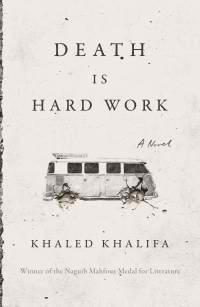
First published in Lebanon in 2016; published in translation by Farrar, Straus and Giroux on February 12, 2019
On his father’s deathbed, Bolbol promises to bury his father’s body in the grave of his father’s sister. It is a promise he will soon regret. The grave is in Anabiya, hundreds of miles from the Damascus hospital where his father died. People in Syria are dying in droves, their bodies occupying mass graves. The “martyrs” who die for the state are no longer given funerals; corpses line the streets. Bolbol has promised to give his father’s body the kind of attention that even wealthy families can no longer provide to their dead. “The exceptional had become habitual, and tragedies were simply mundane — perhaps that was the worst part of this war.”
Accompanied by his brother Hussein and sister Fatima, Bolbol begins a harrowing journey to Anabiya. If he survives the snipers and bombs, he wants the trip to be his last familial act. His dream is to escape to a peaceful country where he can “inter himself in snow.” But the journey is perilous, particularly when the Mukhabarat (Syrian Intelligence Service) arrest the corpse on the theory that Bolbol’s father was wanted, death not being a defense to his crimes. At later checkpoints, Bolbol is challenged to prove that his father is dead, the putrid corpse itself being insufficient evidence. Syrians are not dead, Bolbol learns, until the government proclaims them dead.
Death Is Hard Work paints a vivid picture of Syria in conflict, a seemingly constant state of affairs. Bolbol is caught in the middle of a Civil War, avoiding any action that might cause the regime to question his loyalty. He has even cancelled cable channels that are disfavored by Hezbollah. He was born in an area that is controlled by the opposition, a fact that has caused thousands like him to disappear. He is also the son of an enemy of the regime, but he has passed every security check. If he were living in an area controlled by the opposition, he would behave in exactly the opposite way to prolong his survival. “Holding onto their lives, despite the misery of them, was the real goal that everyone harbored.”
To illustrate the contrast in Syrian life before and after the civil war that began with the 2011 Arab Spring uprising, the story recounts the history of Bolbol’s father, Abdel Latif. As a teacher for 40 years and a respected member of his village, Latif clung to idealistic memories of the 1960s, another time of upheaval. He remembered the 1960s as a time of elegance and erudition, while professors in the current incarnation of Syria are accused of sedition if they speak out against nationalism.
While Death Is Hard Work illustrates the difficult and dangerous lives of Syrians in a divided country, it does so by telling a universal story. Latif's story is one of love and loss, a story suggesting that age is no barrier to a fresh love. The story of Bolbol and Hussein is one of family conflict that could arise in any culture, although not often under such terrifying circumstances.
The journey through checkpoints on a sniper-infested road is tense. Traffic is frequently halted by gun battles. Bombs fall from the sky, sometimes hitting the highway instead of their intended targets. The army and rebels and bandits are all armed; different checkpoints are controlled by different extremist militias, some of whom are not from Syria. Bolbol and his family can only hope they will survive each day and night as Latif’s corpse bloats in the back seat. Khaled Khalifa makes their fear is palpable. “The calmest of the four was the corpse, of course, which knew no fear or worry; blue tinged, it swelled with perfect equanimity and didn’t care that it might explode at any moment.”
The story dramatizes how peaceful Syrians, like peaceful people all over the world, do their best to cope with a violent environment they had no part in creating. The story is intense and, while it is relatively short, it is difficult to read without taking frequent breaks to refresh a mind that is overwhelmed by the mental stench of a decaying corpse (I had the same reaction to Faulkner’s As I Lay Dying, a novel I love although the imagery still troubles me, decades after reading it).
Death Is Hard Work tells a powerful story about sympathetic characters who undergo a life-changing experience in a dangerous place and time. Books like this are essential for readers who want to understand and reflect upon the trauma that so many of the world’s residents endure.
RECOMMENDED